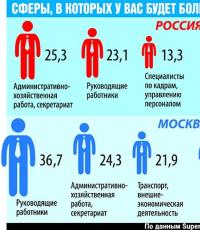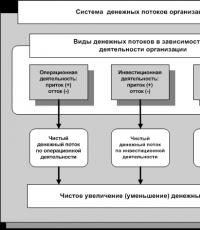Job responsibilities of a general clinical nurse. Job responsibilities of a nurse. Nurse's rights
General provisions Labor Code The Russian Federation does not classify a job description as one of the documents subject to mandatory registration during employment. However, in medical organizations, a job description must be developed for each medical worker. This is a special requirement of the legislation on the basics of protecting the health of citizens in the Russian Federation.
In accordance with the provisions Federal Law“On the fundamentals of protecting the health of citizens in the Russian Federation” No. 323-FZ of November 21, 2011, medical workers are obliged to provide medical care in accordance with their qualifications, job descriptions, official and official responsibilities (clause 1, part 2, article 73 of the Federal Law No. 323-FZ dated November 21, 2011).
Indirectly, the need for a job description is confirmed by such regulatory documents as qualification directories for positions of managers, specialists and employees.
For example
In the qualification directory of positions for managers of specialists and employees, approved. By Order of the Ministry of Health and Social Development No. 541n dated July 23, 2010, Section “ Qualification characteristics positions of workers in the healthcare sector" it is directly stated: "Qualification characteristics ... are used as regulatory documents, and also serve as the basis for the development of job descriptions containing a specific list of job responsibilities, taking into account the characteristics of the work of employees of medical organizations.”
The Federal Service for Labor and Employment, in relation to employees of any positions, in Letter dated August 9, 2007 No. 3042-6-0, reports the following: “The Labor Code does not contain any mention of job descriptions, although job descriptions are an integral regulatory tool labor relations. This is not just a formal document, but a document that defines the tasks, qualification requirements, functions, rights, duties, and responsibilities of the employee. It seems that job descriptions should be developed for each position (including vacant ones) available in the staffing table.”

Similar conclusions are contained in letter No. 6234-TZ dated November 24, 2008.
Let's supplement the conclusions Federal service on labor and employment and let’s say that a job description is a document that establishes detailed regulation of an employee’s actions in the workplace, especially in terms of rights and responsibilities, specific work and assignments within the framework of the labor function.
In the previous material, we drew attention to the fact that the rights and obligations of an employee specified in relation to working conditions are among additional conditions employment contract, that is, they are not subject to mandatory inclusion in the contract. In addition, in a number of cases for a certain type responsible work It is not advisable to clutter the text of the employment contract with a list of everything that the employee must do daily. Therefore, in practice, the job description becomes the document on the basis of which, in the future, the employee can be “asked” to perform the assigned work for the position held.
For example, the Supreme Court, considering the legality of judicial acts on the claim for recognition of the dismissal order nurse boarding home for the elderly and disabled was illegal, in his conclusions he relied on the provisions of the job description (Appeal ruling of the Supreme Court of the Republic of Tyva dated July 11, 2012 in case No. 364/2012).

Regulatory documents used to draw up job descriptions.
To prepare a job description, it is necessary to rely on both general regulatory requirements for employees, regardless of position, and special regulatory requirements for the performance of work for a specific position.
These requirements are contained in the following main regulations:
- Labor Code of the Russian Federation;
- Federal Law “On the fundamentals of protecting the health of citizens in Russian Federation» No. 323-FZ dated November 21, 2011;
- Order of the Ministry of Health and Social Development No. 541n dated July 23, 2010 “On approval of the Unified Qualification Directory of positions for managers, specialists and employees, section “Qualification characteristics of positions of workers in the field of healthcare”;
- Order of the Ministry of Health of Russia No. 707n dated October 8, 2015 “On approval of qualification requirements for medical and pharmaceutical workers with higher education in the direction of training “Healthcare and Medical Sciences”;
- Order of the Ministry of Health of Russia No. 83n dated February 10, 2016 “On approval qualification requirements to medical and pharmaceutical workers with secondary medical and pharmaceutical education";
- Regulations professional standards, which are currently replacing the qualification requirements: specialist in pediatrics (Order of the Ministry of Labor of Russia No. 400n dated June 25, 2015); dentist (Order of the Ministry of Labor of Russia No. 227n dated May 10, 2016); junior medical personnel (Order of the Ministry of Labor of Russia No. 2n dated January 12, 2016), etc.
To prepare a job description, procedures and standards for providing medical care. Procedures and standards for the provision of medical care are mandatory for implementation on the territory of the Russian Federation by all medical organizations (and, therefore, medical workers) on the basis of Art. 37 of Federal Law No. 323-FZ of November 21, 2011

Job description structure.
Since the Labor Code of the Russian Federation does not classify a job description as a mandatory document, there are no requirements for its execution in the legislation.
Law enforcement practice is based on the inclusion of the following sections in this document:
- Section "General Provisions"
This section specifies: job title, structural unit of the organization; regulations on the basis of which the document was drawn up, as well as which the employee must know and comply with in his position; requirements for level of education, work experience, knowledge, skills. In this section, you can indicate the immediate supervisor, whose orders the employee must obey.
- Section “Employee Rights and Responsibilities”
This section is compiled taking into account the general as well as special legal requirements regarding a specific position. These requirements are contained in the above regulations and serve as the basis for the development of the document.
However, this section should not be reduced to a formal “copying” of the provisions of qualification reference books and other regulations. Using pre-prepared general templates from available information sources as the final document is also not advisable. This will lead to the fact that the job description will not become a “working” document, but a formal, “dead” document.
The range of responsibilities within the qualification requirements is different for all employees. Therefore, this section, as a rule, lists the rights and responsibilities specified in relation to the working conditions of a particular employee at a particular place. The job description may specify details that are important for the performance of assigned duties, affecting the quality of medical care, etc.
For example, the general requirement “prevention of bedsores” can be spelled out in detail: “must... turn the patient over in accordance with the schedule once every 1-4 hours.” General requirement“monitor the cleanliness and order in the wards” can be spelled out in detail “must (a) monitor the cleanliness and order in the wards, including carrying out wet cleaning in the wards at least 2 times per duty, taking out garbage bags at least 1 time per duty etc.".
It is worth repeating and drawing attention to the fact that the rights and responsibilities under the job description must be correlated with the employee’s position, procedures and standards of care, and documents on the employee’s medical education. The actual fulfillment of rights and obligations is structured in a similar way.
For example, the administration of intravenous anesthesia to a patient not by an anesthesiologist-reanimatologist, but by a surgeon in the event of the patient’s death, may entail liability under Art. 109 of the Criminal Code of the Russian Federation for causing death by negligence due to improper execution professional responsibilities. The surgeon does not know general anesthesia and should not administer it.
- Section "Final Provisions"
This section, as a rule, specifies the employee’s responsibility, reporting (if any), the form and frequency of its submission, etc.

These are the main standard sections of the job description.
Their presence is most likely due to the structure of the qualification requirements for a specific position contained in qualification reference books positions of managers, specialists and employees.
Following the conclusions of the Federal Service for Labor and Employment, in practice the job description is drawn up in the form of a separate document or annex to employment contract(Letter dated August 9, 2007 No. 3042-6-0).
Job description is developed and approved in relation to a specific position according to the staffing table. However, the law does not prohibit “personalized” instructions. The need for “nominal” instructions may be dictated by practice. For example, in relation to one position, but to different employees, you can specify job responsibilities, volume, area of work, etc.
Developing a job description for a medical worker is always collaboration lawyer/HR and medical worker. Since this document contains terms and conditions professional activity, which require special medical knowledge in a specific area.

Responsibility of a medical organization for the lack of job description.
Since the legislation on the basics of protecting the health of citizens in the Russian Federation establishes the obligation of a medical worker to have a job description and fulfill its requirements, the absence of this document in an organization can be qualified as an administrative offense and entail liability under Art. 5.27 Code of Administrative Offenses of the Russian Federation.
Responsibility comes in the form of a warning, an administrative fine, or disqualification for a certain period. The maximum fine under this article is 70,000 rubles.
A nurse is a medical worker who has a secondary specialized education and belongs to the nursing staff. She is an important assistant to the doctor in any medical institution. The responsibilities of a nurse include the implementation of the nursing process and the implementation of medical prescriptions.
Nursing positions
Depending on the profile of the work performed, nurses are divided into:
- Chief nurse – has a higher medical education obtained at the faculty of higher nursing education of medical universities. She supervises the work of junior and mid-level medical staff.
- The senior nurse is the main assistant to the head of the department in solving administrative and business issues. Her responsibilities include monitoring the work of the department's nursing staff and junior staff.
- Guard or ward nurse - monitors the condition of patients and provides care for them, and also carries out the appointments of the ward doctor. Feeding bedridden patients is also the responsibility of the nurse.
- Procedural nurse - as prescribed by the doctor, performs intravenous infusions and injections, collects venous blood for laboratory tests, and assists the doctor in performing medical procedures.
- Operating nurse - prepares linens, instruments, sutures and dressings for the operation. Responsible for maintaining asepsis and antisepsis in the operating room. Helps surgeons during surgery.
- Nurse - anesthetist. Helps the anesthesiologist provide anesthetic care for various surgical interventions. Carries out accounting and write-off of narcotic and psychotropic drugs.
- Community nurse – during a doctor’s appointment with patients, she assists him and carries out treatment procedures prescribed by the district doctor at home. Directly participates in various preventive measures.
- Dietsnist (dietary nurse) – works under the guidance of a nutritionist. She is responsible for the quality and organization of medical nutrition, controls the distribution of food, and draws up the menu. In addition, she is obliged to monitor the sanitary condition of the canteen for patients and the catering unit.
- Nurses working with doctors of narrow specialties (neurologist, otorhinolaryngologist, ophthalmologist, orthopedist, etc.)
In accordance with job descriptions, the nurse has the right not only to give orders to the nurses, barmaids, and sister-hostess, but also to control their implementation.
Responsibilities of the head nurse
The work of the head nurse largely determines the cleanliness and comfort of the department, the style of work of the nursing staff and the culture of patient care. Her job responsibilities include:
- Implementation of rational placement and use of junior and mid-level medical staff, drawing up duty and vacation schedules;
- Ensuring a clear rhythm of work in the treatment and dressing rooms;
- Monitoring compliance by employees under her command with labor discipline, timely execution of medical prescriptions;
- Keeping records of the use and consumption of dressings, bacterial preparations, medicines and medical instruments;
- Accounting and storage of potent and narcotic drugs;
- Maintaining medical records;
- Implementation support scientific organization labor;
- Drawing up training plans nurses departments, organization and control of their implementation.
Job description of a nurse
The duties of a nurse include:
- Carrying out all stages of the nursing process. This includes conducting an initial assessment of the patient's health status, interpreting the data obtained, drawing up an individual care plan and evaluating the results achieved.
- High-quality and timely implementation of all therapeutic, diagnostic and preventive procedures prescribed by the doctor.
- Assisting the doctor during minor operations or therapeutic and diagnostic procedures in both inpatient and outpatient settings.
- Providing pre-hospital emergency care in case of disasters, accidents and acute diseases, followed by sending the patient to a medical institution or calling a doctor to him.
- Self-administration medicines in case of anaphylactic shock or other life-threatening conditions if it is impossible for a doctor to arrive in a timely manner. Special Instructions for nurses, they describe in detail the procedure for their actions in extreme situations.
- Reporting to the head of the department, ward or doctor on duty about all complications in patients that arise during medical procedures.
- Reporting to the head, ward or doctor on duty about violations by patients of the internal regulations of the medical institution.
- Ensuring proper storage, accounting and write-off of medications. Monitoring patients' medication intake.
- Maintaining medical documentation approved by higher organizations.
I CONFIRM:
[Job title]
_______________________________
_______________________________
[Name of company]
_______________________________
_______________________/[FULL NAME.]/
"_____" _______________ 20___
JOB DESCRIPTION
Nurse
1. General Provisions
1.1. This job description defines and regulates the powers, functional and job responsibilities, rights and responsibilities of a nurse [Name of organization in genitive case] (hereinafter referred to as the Medical Organization).
1.2. A nurse is appointed to a position and dismissed from a position as established by the current labor legislation order by order of the head Medical organization.
1.3. A nurse belongs to the category of specialists and is subordinate to [names of subordinate positions in the dative case].
1.4. The nurse reports directly to [name of the position of the immediate supervisor in the dative case] of the Medical Organization.
1.5. A person with secondary education is appointed to the position of nurse professional education in the specialty “General Medicine”, “Midwifery”, “Nursing” and a specialist certificate in the specialty “Nursing”, “General Practice”, “Nursing in Pediatrics” without presenting requirements for work experience.
1.6. The nurse is responsible for:
- effective performance of the work assigned to her;
- compliance with the requirements of performance, labor and technological discipline;
- the safety of the documents (information) that are in her custody (became known to her) and contain (constitute) the commercial secret of the Medical Organization.
1.7. The nurse should know:
- laws and other regulatory legal acts of the Russian Federation in the field of healthcare;
- theoretical foundations of nursing;
- fundamentals of the diagnostic and treatment process, disease prevention, promotion of a healthy lifestyle;
- rules for operating medical instruments and equipment;
- statistical indicators characterizing the health status of the population and the activities of medical organizations;
- rules for the collection, storage and disposal of waste from medical organizations;
- the basics of the functioning of budgetary insurance medicine and voluntary health insurance;
- basics of valeology and sanology;
- basics of dietetics;
- basics of clinical examination, social significance of diseases;
- basics of disaster medicine;
- rules for maintaining accounting and reporting documentation structural unit, main types of medical documentation;
- medical ethics;
- psychology of professional communication;
- basics of labor legislation;
- internal rules labor regulations;
- labor protection and fire safety rules.
1.8. The nurse in her activities is guided by:
- local acts and organizational and administrative documents of the Medical Organization;
- internal labor regulations;
- rules of labor protection and safety, ensuring industrial sanitation and fire protection;
- instructions, orders, decisions and instructions from the immediate supervisor;
- this job description.
1.9. During the period of temporary absence of a nurse, her duties are assigned to [name of deputy position].
The nurse performs the following labor functions:
2.1. Provides pre-medical care and collects biological materials for laboratory research.
2.2. Provides care to patients in medical institutions and at home.
2.3. Sterilizes medical instruments dressings and patient care items.
2.4. Assists when a doctor performs therapeutic and diagnostic procedures and minor operations in outpatient and inpatient settings.
2.5. Prepares patients for various types of studies, procedures, surgeries, and outpatient doctor appointments.
2.6. Ensures the implementation of medical prescriptions.
2.7. Carries out accounting, storage, use medicines and ethyl alcohol.
2.8. Maintains personal records and an information (computer) database of the health status of the population served.
2.9. Manages the activities of junior medical staff.
2.10. Maintains medical records.
2.11. Conducts health education work among patients and their relatives to promote health and prevent diseases, promote a healthy lifestyle.
2.12. Carries out the collection and disposal of medical waste.
2.13. Carries out measures to comply with the sanitary and hygienic regime, the rules of asepsis and antisepsis, the conditions for sterilization of instruments and materials, and the prevention of post-injection complications, hepatitis, and HIV infection.
In case of official necessity, a nurse may be involved in the performance of her duties overtime, in the manner prescribed by the regulations federal legislation about work.
3. Rights
The nurse has the right:
3.1. Give subordinate employees and services instructions and tasks on a range of issues included in its functional responsibilities.
3.2. Monitor the implementation of production tasks, timely completion of individual orders and tasks by subordinate services.
3.3. Request and receive necessary materials and documents related to the activities of the nurse, subordinate services and departments.
3.4. Interact with other enterprises, organizations and institutions on production and other issues related to the competence of the nurse.
3.5. Sign and endorse documents within your competence.
3.6. Submit proposals on the appointment, transfer and dismissal of employees of subordinate departments for consideration by the head of the Medical Organization; proposals to encourage them or to impose penalties on them.
3.7. Use other rights established by the Labor Code of the Russian Federation and others legislative acts RF.
4. Responsibility and performance evaluation
4.1. The nurse bears administrative, disciplinary and material (and in some cases provided for by the legislation of the Russian Federation, criminal) responsibility for:
4.1.1. Failure to carry out or improperly carry out official instructions from the immediate supervisor.
4.1.2. Failure or improper performance of your labor functions and the tasks assigned to her.
4.1.3. Illegal use of granted official powers, as well as their use for personal purposes.
4.1.4. Inaccurate information about the status of the work assigned to her.
4.1.5. Failure to take measures to suppress identified violations of safety regulations, fire safety and other rules that pose a threat to the activities of the enterprise and its employees.
4.1.6. Failure to ensure compliance with labor discipline.
4.2. The nurse’s work is assessed by:
4.2.1. By the immediate supervisor - regularly, in the course of the employee’s daily performance of his labor functions.
4.2.2. Certification Commission enterprises - periodically, but at least once every two years, based on documented results of work for the evaluation period.
4.3. The main criterion for assessing the work of a nurse is the quality, completeness and timeliness of her fulfillment of the tasks provided for in these instructions.
5. Working conditions
5.1. The nurse’s work schedule is determined in accordance with the internal labor regulations established in the Medical Organization.
6. Signature right
6.1. To ensure her activities, the nurse is given the right to sign organizational and administrative documents on issues within her competence by this job description.
I have read the instructions ___________/___________/ “____” _______ 20__
The functions of a nurse are defined by the WHO Regional Office for Europe nursing, and this is evidenced by international project WHO Regional Office for Europe - LEMON. This project provides for cooperation between different countries (including Russia) in the framework of nursing and midwifery issues, provides information about the needs, achievements and potential projects in countries that are members of the international community.
The first functionis the implementation of nursing care, for example, preventive measures, nursing interventions related to rehabilitation, psychological support for a person or his family. This function is most effective if carried out as part of the nursing process. Nursing care includes:
Assessing the needs of the person and his family;
Identifying needs that can be most effectively met through nursing intervention;
Identification of priority health problems that can be addressed through nursing intervention;
Planning and implementation of necessary nursing care; involving the patient and, if necessary, members of his family and friends in care;
Use of accepted professional standards.
Second function- training of patients and nursing staff includes:
Assessing a person’s knowledge and skills related to maintaining and restoring health;
Preparation and provision of the necessary information at the appropriate level;
Help other nurses, patients and other staff acquire new knowledge and skills.
Third function- the nurse's performance of a dependent and independent role as part of a team of medical workers serving the patient is just beginning to be introduced in Russia. However, without it, nursing will not be able to take its proper place in the health care system. A component of this function is collaboration with the patient, his family, and health care providers in planning and organizing patient care.
Fourth function - development of nursing practice with the help research activities(also just beginning to be implemented).
The main goals of nursing are:
Explaining to the population and the administration of the treatment and prevention institution (HCI) the importance and priority of nursing at the present time;
Development and effective use of nursing potential by expanding professional responsibilities and providing nursing services that best meet the needs of the population;
Providing and conducting an educational process for the training of highly qualified nurses and nursing managers, as well as conducting postgraduate training of mid-level and senior nursing specialists;
Developing a certain style of thinking among nurses.
Nursing solves the following problems:
1) development and expansion of organizational and managerial reserves for working with personnel;
2) consolidation of professional and departmental efforts to provide medical services to the population;
3) carrying out work to ensure advanced training and professional skills of personnel;
4) development and implementation of new technologies in the field of nursing care;
5) implementation of advisory nursing care;
6) provision high level medical information:
7) conducting sanitary education and preventive work;
8) conducting research work in the field of nursing;
9) creation of quality standards for nursing care.
Priority development of nursing will ensure quality new level medical assistance to the population through effective use nurses, expanding their professional responsibilities and providing nursing services that best meet the needs of the population.
Nursing practice strategy must respond to the changing needs of the health care system; have a scientific basis; be socially acceptable; ensure universal accessibility of medical care (especially to those groups of the population that have the greatest need for it); provide assistance within the walls medical institution, at home and at the family level; guarantee high quality help.
The job description of a nurse is one of the documents documenting the labor relationship. It contains a list of duties, working conditions, rights and responsibilities of the parties. The former may undergo changes taking into account the peculiarities of the functioning of the institution and often vary in each healthcare institution.
Below standard form can be used as a sample for drawing up a job description for a nurse in a clinic, ward, physiotherapy, dental, treatment room, surgical room, therapeutic department, etc.
Sample of a typical nurse job description
I. General provisions
1. The nurse is included in the specialist category.
2. A person holding the position of a nurse must have a secondary medical education in the specialty “Nursing” and one of qualification categories: II, I, highest.
3. The appointment and dismissal of a nurse is made by order of the head of the institution.
4. The nurse reports to the head of the department or senior nurse. In his work he is guided by the Charter, orders and instructions of the head of the institution, his immediate superior, and this job description.
5. The nurse should know:
- laws of the Russian Federation and regulations related to healthcare;
- the basics of the process of diagnosis, therapy, care, disease prevention, dissemination of the principles of a healthy lifestyle;
- techniques and methods of providing first aid people;
- composition and organizational structure of healthcare institutions;
- safety standards, including when handling medical equipment and tools;
- rules of fire protection, industrial sanitation;
- internal work rules.
6. During the absence of a nurse, her rights and functional responsibilities are transferred to another official, which is recorded in the order of the organization.
II. Job responsibilities of a nurse
The nurse performs the following duties:
1. Completes all stages of the nursing process. These include: initial assessment of the patient’s condition, interpretation of the data obtained, planning of care, evaluation of the results of actions.
2. Conducts high-quality preventive, diagnostic, and therapeutic procedures prescribed by the doctor.
3. Assists during operations, therapeutic and diagnostic manipulations by a doctor.
4. Ensures and maintains infection safety. It includes maintaining a sanitary and hygienic regime, handling aseptics, proper storage, processing, sterilization, and use of medical devices.
5. Provides emergency assistance to people in case of acute illnesses, accidents, and disasters. Further calls the doctor to the patient or refers him to a medical institution.
6. Administers antishock drugs and medications to patients for health reasons. These actions are carried out if it is impossible for the doctor to arrive to the patient in a timely manner, in accordance with the established procedure for applying measures.
7. Informs the doctor or manager (in their absence, the doctor on duty) about:
- all detected complications and diseases of patients resulting from medical procedures;
- violation of the internal regulations of the institution.
8. Ensures proper storage and accounting of medications, patient compliance with procedures, and taking pharmacological agents.
9. Maintains medical documentation according to approved forms.
10. Interacts with facility staff and employees of other services in the interests of the patient.
11. Carry out sanitary educational work to promote health and prevent illnesses.
12. Complies with standards of professional communication and treatment of patients.
III. Rights
The nurse has the right:
1. Obtain the information necessary to perform your duties.
2. Submit for consideration measures to improve nursing in a medical institution.
3. Make demands on the head nurse of the department to provide the workplace with equipment and materials. These include: equipment, tools, care items.
4. Pass certification in the prescribed manner, take measures to improve your professional knowledge and skills.
5. Take part in the work of professional nursing associations.
IV. Responsibility
The nurse is responsible for:
1. Improper performance of one’s official duties as regulated by this job description.
2. Failure to comply with the current labor law Russian Federation.
3. Violation of administrative, criminal, civil legislation of the Russian Federation, committed by an official in the performance of duties.
4. Causing material damage.
5. Errors in the performance of their duties, causing serious consequences to the life and health of patients.
6. Failure to comply with instructions, orders, regulations, including the preservation of confidential information, medical confidentiality, internal labor regulations, discipline, and safety precautions.
V. Working conditions
1. The working conditions of a nurse are determined by the Internal Labor Regulations, the provisions of the Labor Code of the Russian Federation, orders, instructions of the management of the institution.





